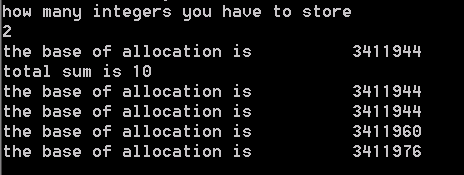Find out the address after malloc

#include <stdio.h>
#include <malloc.h>
main() {
int *base;
int i,j;
int cnt = 3;
int sum = 0;
base = (int *)malloc(cnt * sizeof(int));
printf("the base of allocation is %16lu \n",base);
if(!base)
printf("unable to allocate size \n");
else {
for(j = 0;j < cnt; j++)
*(base+j)=5;
}
for(j = 0;j < cnt; j++)
sum = sum + *(base+j);
printf("total sum is %d\n",sum);
free(base);
printf("the base of allocation is %16lu \n",base);
base = (int *)malloc(cnt * sizeof(int));
printf("the base of allocation is %16lu \n",base);
free(base);
base = (int *)calloc(10,2);
printf("the base of allocation is %16lu \n",base);
free(base);
}
Related examples in the same category